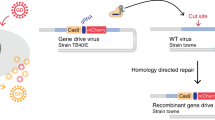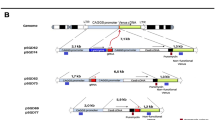Abstract
Injection of homologous DNA sequences into nuclei of cultured mammalian cells induces mutations in the cognate chromosomal gene. It appears that these mutations result from incorrect repair of a heteroduplex formed between the introduced and the chromosomal sequence. This phenomenon is termed ‘heteroduplex induced mutagenesis’ The high frequency of these events suggests that this method may prove useful for introducing mutations into specific mammalian genes.
This is a preview of subscription content, access via your institution
Access options
Subscribe to this journal
Receive 51 print issues and online access
$199.00 per year
only $3.90 per issue
Buy this article
- Purchase on Springer Link
- Instant access to full article PDF
Prices may be subject to local taxes which are calculated during checkout
Similar content being viewed by others
References
Smithies, O., Gregg, R. G., Boggs, S. S., Koralewski, M. A. & Kucherlapati, R. S. Nature 317, 230–234 (1985).
Thomas, K. R., Folger, K. R. & Capecchi, M. R. Cell 44, 419–428 (1986).
Lin, F. L., Sperle, K. and Sternberg, N. Proc. natn. Acad. Sci. U.S.A. 82, 1391–1395 (1985).
Smith, A. J. H. & Berg, P. Cold Spring Harb. Symp. Quant. Biol. 49, 171–181 (1984).
Hudziak, R. et al. Cell 31, 137–146 (1982).
Folger, K. R., Thomas, K. R. & Capecchi, M. R. Molec. cell. Biol. 5, 59–69 (1985).
Capecchi, M. R. Cell 22, 479–488 (1980).
Sanger, F., Nicklen, S. & Coulson, R. Proc. natn. Acad. Sci. U.S.A. 74, 5463–5467 (1977).
Ullman, A. Gene 29, 27–31 (1984).
Beck, E., Ludwig, G., Auerswald, E. A., Riess, B. & Schaller, H. Gene 19, 327–336 (1982).
Hutchinson, C. A. et al. J. biol. Chem. 253, 6551–6560 (1978).
Roth, D. B., Porter, T. N. & Wilson, J. H. Molec. cell. Biol. 5, 2599–2607 (1985).
Peabody, D. S. & Berg, P. Molec. cell. Biol. 6, 2695–2703 (1986)
Peabody, D. S., Subramani, S. & Berg, P. Molec. cell. Biol. 6, 2704–2711 (1986).
Hughes, S. et al. Molec. cell. Biol. 4, 1738–1746 (1984).
Dixon, L. K. & Hohn, T. EMBO J. 3, 2731–2736 (1984).
Johansen, H., Schumperli, D. & Rosenberg, M. Proc. natn. Acad. Sci. U.S.A. 81, 7698 (1984).
Liu, C., Simonsen, C. C. & Levinson, A. D. Nature 309, 82–85 (1984).
Author information
Authors and Affiliations
Rights and permissions
About this article
Cite this article
Thomas, K., Capecchi, M. Introduction of homologous DNA sequences into mammalian cells induces mutations in the cognate gene. Nature 324, 34–38 (1986). https://doi.org/10.1038/324034a0
Received:
Accepted:
Issue Date:
DOI: https://doi.org/10.1038/324034a0
Comments
By submitting a comment you agree to abide by our Terms and Community Guidelines. If you find something abusive or that does not comply with our terms or guidelines please flag it as inappropriate.



